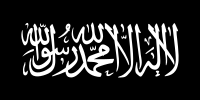 Al-Muhajiroun uses the black Flag of Jihad with the shahada in white. | |
| Abbreviation | AM |
|---|---|
| Predecessor | Hizb ut-Tahrir |
| Successor | Al Ghurabaa (2004–2006) The Saved Sect (2005–2006) Islam4UK (2008–2010) Muslims Against Crusades (2010–2011) |
| Formation | 3 April 1983 |
| Founder | Omar Bakri Muhammad |
| Type | Islamist, terrorists |
| Purpose | Islamism Salafi jihadism Anti-Western sentiment |
| Headquarters | Jeddah, Saudi Arabia |
| Location |
|
| Leader | Anjem Choudary |
Key people | |
| Part of a series on Islamism |
|---|
|
|
Al-Muhajiroun (Arabic: المهاجرون, "The Emigrants") is a proscribed terrorist[1][2] network based and banned in Saudi Arabia and active for many years in the United Kingdom. The founder of the group was Omar Bakri Muhammad, a Syrian who previously belonged to Hizb ut-Tahrir; he was not permitted to re-enter Britain after 2005. According to The Times, the organisation has been linked to international terrorism, homophobia, and antisemitism.[3] The group became notorious for its September 2002 conference "The Magnificent 19", praising the September 11, 2001 attacks. The network mutates periodically so as to evade the law; it operates under many different aliases.
The group in its original incarnation operated openly in the United Kingdom from 14 January 1986 until the British Government announced an intention ban in August 2005. The group preemptively "disbanded" itself in 2005 to avoid this; two aliases used by the group were proscribed by the British Home Secretary under the Terrorism Act 2006: Al Ghurabaa and The Saviour Sect. Further proscriptions followed with the Terrorism Act 2000 where Islam4UK was proscribed as an Al-Muhajiroun alias[4][5][6] and Muslims Against Crusades followed in 2011. More recent aliases have included Need4Khilafah and the Shariah Project, proscribed in 2014, just before prominent members, including Anjem Choudary were sent to prison (they have subsequently been released).[7][8]
The organisation and its activities have been condemned by larger British Muslim groups such as the Muslim Council of Britain. In the United Kingdom, Al-Muhajiroun is the most notorious of the domestic Salafi-jihadist groups and its public spokesman Anjem Choudary has significant name recognition; it is considered more radical than its initial parent organisation the Hizb ut-Tahrir, whose British-based branch does not advocate violence against the United Kingdom and were not proscribed until January 2024.
Individual members of Al-Muhajiroun have been implicated in a number of terrorist attacks, including the murder of Lee Rigby (Michael Adebolajo and Michael Adebowale), the 2017 London Bridge attack (Khuram Butt), and the 2019 London Bridge stabbing (Usman Khan). Some members, such as Zacarias Moussaoui, have been implicated in controversies surrounding Al-Qaeda.
It has also operated a Lahore safe house for visiting radicals.[9] Another member, Siddhartha Dhar, became an executioner for the Islamic State of Iraq and the Levant (ISIL).[7]
- ^ Washington Times: "HUSAIN: Anti-Shia Muslim terrorists convicted in London" 14 May 2014 |"Members of the Salafi-Wahhabi Islamist terrorist group Al Muhajiran were convicted this week of attacking Shia Muslims in London in 2013"
- ^ Nawaz, Maajid (30 July 2014). Radical: My Journey out of Islamist Extremism. Lyons Press. p. 81. ISBN 9780762795529.
- ^ Fielding, Nick (24 July 2005). "Terror links of the Tottenham Ayatollah". The Sunday Times. Archived from the original on 24 February 2011. Retrieved 21 January 2017.
- ^ "Government to ban Islam4UK under terror laws". The BBC. 12 January 2010. Retrieved 12 January 2010.
- ^ Casciani, Dominic (5 January 2010). "Profile: Islam4UK". BBC News. Retrieved 12 January 2010.
- ^ "The Proscribed Organisations (Name Changes) Order 2010". The Proscribed Organisations (Name Changes) Order 2010 |legislation.gov.uk |2010
- ^ a b Dearden, Lizzie (15 February 2019). "UK's 'most dangerous extremist group' regenerating after terrorist prisoners released". The Independent. Archived from the original on 16 February 2019. Retrieved 10 April 2019.
- ^ Watson, Richard (27 June 2017). "Has al-Muhajiroun been underestimated?". BBC. Retrieved 10 April 2019.
- ^ Nick Fielding (24 July 2005). "Terror links of the Tottenham Ayatollah: Nick Fielding reveals the influence of a preacher once seen as a mere loudmouth". The Sunday Times. London. Archived from the original on 24 February 2011. Retrieved 24 October 2010.
More worrying is the number of ALM members associated with violence abroad. One journalist who visited an ALM safe house in Lahore before the authorities closed it said that recruits from Britain referred to Indians as "subhumans" and were violently opposed to homosexuals and Jews.
